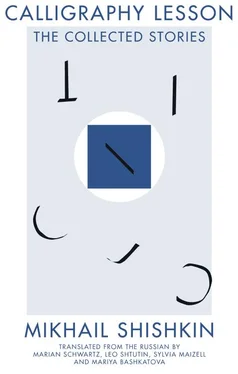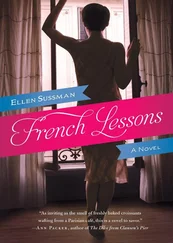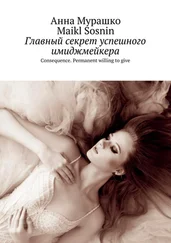Mikhail Shishkin - Calligraphy Lesson
Здесь есть возможность читать онлайн «Mikhail Shishkin - Calligraphy Lesson» весь текст электронной книги совершенно бесплатно (целиком полную версию без сокращений). В некоторых случаях можно слушать аудио, скачать через торрент в формате fb2 и присутствует краткое содержание. Город: Dallas, Год выпуска: 2015, ISBN: 2015, Издательство: Deep Vellum Publishing, Жанр: Современная проза, на английском языке. Описание произведения, (предисловие) а так же отзывы посетителей доступны на портале библиотеки ЛибКат.
- Название:Calligraphy Lesson
- Автор:
- Издательство:Deep Vellum Publishing
- Жанр:
- Год:2015
- Город:Dallas
- ISBN:978-1-941920-02-2
- Рейтинг книги:4 / 5. Голосов: 1
-
Избранное:Добавить в избранное
- Отзывы:
-
Ваша оценка:
- 80
- 1
- 2
- 3
- 4
- 5
Calligraphy Lesson: краткое содержание, описание и аннотация
Предлагаем к чтению аннотацию, описание, краткое содержание или предисловие (зависит от того, что написал сам автор книги «Calligraphy Lesson»). Если вы не нашли необходимую информацию о книге — напишите в комментариях, мы постараемся отыскать её.
Calligraphy Lesson — читать онлайн бесплатно полную книгу (весь текст) целиком
Ниже представлен текст книги, разбитый по страницам. Система сохранения места последней прочитанной страницы, позволяет с удобством читать онлайн бесплатно книгу «Calligraphy Lesson», без необходимости каждый раз заново искать на чём Вы остановились. Поставьте закладку, и сможете в любой момент перейти на страницу, на которой закончили чтение.
Интервал:
Закладка:
“Oh come on, Dad,” he laughed, “it’s simple! That would be the saucepan lid!”
The lid!
But of course! How didn’t I twig at once!
Translated by Leo ShtutinThe Bell Tower of San Marco
‘“Be fruitful and multiply!’ Can that really be all that’s bequeathed to us? Why even the mice and Koch’s microbes honor this behest. But man is infinitely greater than his physical self. And how can you reduce all of me, all my untapped resources, the yearning to accomplish something important, essential, that serves mankind, my people, my country—to propagation!”
That is what Lydia Kochetkova writes in October 1898, to her future husband, Fritz Brupbacher.
I first came across this remarkable love story when I was collecting material for my Russian Switzerland . Six thousand letters and postcards are preserved in the archives of the International Institute of Social History in Amsterdam.
Seventeen years of a broken era are captured in this correspondence.
Brupbacher was almost unknown in Russia, and not even a footnote in Switzerland, yet against the dull background of Swiss politicians, he stood out for an ‘un-Swiss’ trait—his inability to compromise. A doctor in a working class district of Zurich, a deputy to the city council, a dedicated internationalist, essayist, socialist, he was expelled from the Swiss Socialist Party during World War I for his pacifism. Though a founder of the Swiss Communist Party, in 1932 he was also expelled from its ranks for excoriating Stalin. An author of socialist brochures and engaging memoirs, he had a true command of the language, and before his death in January 1945 at age 70, he regretted not having become a writer.
It’s interesting that on the initiative of this very Fritz Brupbacher, a memorial plaque to Lenin was mounted on Spiegelgasse 14. Fritz knew Lenin and many other Russian revolutionaries, both sung and unsung.
As a medical student in 1897 in Zurich, Fritz met a Russian girl and fell in love. She became his wife. In his memoirs, “60 Years as a Heretic,” published in 1935, he said of this union, “I was married to the Russian Revolution.”
Lydia Kochetkova was 25 when she met Brupbacher. Born in Samara, she attended courses for women in Petersburg given by Lesgaft, a famous physician, then studied in Berlin, Geneva, and Berne. It was in Zurich that she took her MD and found the love of her life.
“A doctor—that’s a path, not a goal,” Lydia writes in an early letter, pointing out to Fritz the difference between Swiss and Russian medical students. “My goal is revolution.”
Lydia’s idol was Vera Figner, a physician and member of the People’s Will Party, following whose example Lydia came to medical school in Switzerland. In her memoirs, Figner sheds light on the special way Russian students saw their future profession—a doctor could spread propaganda freely among the people.
The Russian air was filled with revolutionary ideals then. As for the Kochetkov family, they had their own special involvement with the revolutionaries. Though almost nothing is known of Lydia’s father, who died early, her letters reveal that from childhood she was intrigued with the stories of her mother, Anastasia Ivanovna, a native of Irkutsk. She told of how, as a starry-eyed schoolgirl, the great iconoclast Prince Kropotkin, then still a tsar’s officer, asked for her hand, and how her parents refused him. The young Anastasia, who was close to revolutionary circles and herself at one time under secret surveillance, was courted by two prominent members of the People’s Will Party, Lazarev and Shishko. As émigrés in Switzerland, these two influenced Lydia to join its successor, the Socialist Revolutionary Party.
Even before meeting Fritz, Lydia had a clear purpose in life. “I’m ready to sacrifice everything I have for the sake of my people.”
It’s no small wonder this Russian woman impressed the young Helvetian. Fritz recalls, “The Russian students despised us Swiss medical students who aimed for a solid profession and a solid income. In Lydia’s eyes, the Swiss, just like the other Western Europeans, had, on the whole, many failings: narrow-mindedness, a fixation on material values, opportunism, crassness and egoism. The Swiss student had his eye on dividends and a profitable marriage, the Russian on altering the world. She infected me with Socialism, had me reading certain books, took me to meetings. I was so dazzled by her and her burning faith in the socialist ideal I was ready to follow her anywhere.”
A fascination with socialist thinking and the allure of all things Russian were intertwined in his feelings for Lydia. “This Russian woman was for me a complete revelation, a bundle of passion, raw emotions and rare power. Our differences showed up everywhere, everyday, in the way we spoke, and thought, in the smallest detail, even how we prepared for exams: the Swiss took this fortress over a long-month’s siege, the Russians—in a head-on attack.”
Many years later, when he was trying to make sense of this faith in Socialism gripping the Russian youth, Fritz writes, “For her the people and love of the people was like a religion. But you couldn’t say the word ‘religion’ in her presence. She longed for martyrdom—to be exiled to Siberia or, better still, end up on the gallows. These young Russians were like the early Christians, marching to their execution with tears of joy.”
Fritz described the ‘altar’ in her tiny room—engravings and photographs of revolutionary martyrs such as Countess Sophia Perovskaya, Vera Figner, and other female terrorists.
“Socialism for the Russians,” we read further in his memoirs, “really meant a loss of one’s ego through self-abnegation. Everything else was secondary. It was a passion to live for others. Lydia sacrificed her interest in the natural sciences to become a doctor, live among the common people, and devote herself to them. She abhorred tsarism. Her models were the regicides of the Perovskaya circle. This fervor, felt at the core, for self-sacrifice to an idea, this desire to efface her ego confused me and at the same time held something magical for one about whom the world said, ‘Without money, there are no Helvetians.’”
The two were thrust together by their love despite all their emotional and cultural differences.
In her letter of 25 July, 1899 she writes, “Don’t worry that I fell in love with you because you became a socialist. If Socialism were all that counted here, I would have fallen in love with some like-minded fellow like Bebel, not you. Your conversion removed any possible obstacle to our love. Ever since you became a socialist I forget you’re a socialist and I love you because I love you. I’m so happy.”
And in another letter of the same year, “My sweetheart! I love you precisely because you’re not at all like a Swiss! I could never fall in love with one of those philistines who just think of their own little house and vegetable garden! Right away I sensed in you one of us.”
Living in the same city and meeting often, they wrote each other daily, and even several times a day.
Now with a medical degree, Fritz opened a practice in Aussersihl, a working class district of Zurich, and became active politically. The workers elected him their deputy to the city council. Lydia too finished her university course and it was time to think about their life together.
He proposed marriage, but the young woman had neither the intention nor the wish to tie her fate to Switzerland. She saw herself as a doctor in the Russian backwoods. The two were in a quandary—both wanted to fight for Socialism, he in his homeland among the Zurich workers, she in Russia among the peasants. And yet both wanted to be together.
Читать дальшеИнтервал:
Закладка:
Похожие книги на «Calligraphy Lesson»
Представляем Вашему вниманию похожие книги на «Calligraphy Lesson» списком для выбора. Мы отобрали схожую по названию и смыслу литературу в надежде предоставить читателям больше вариантов отыскать новые, интересные, ещё непрочитанные произведения.
Обсуждение, отзывы о книге «Calligraphy Lesson» и просто собственные мнения читателей. Оставьте ваши комментарии, напишите, что Вы думаете о произведении, его смысле или главных героях. Укажите что конкретно понравилось, а что нет, и почему Вы так считаете.












